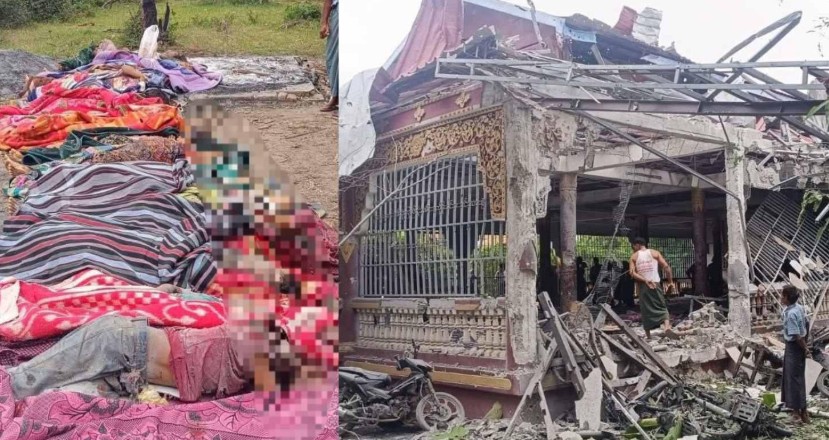Paraglider Bombing Kills 24 at Buddhist Festival in Central Myanmar
A peaceful night gathering turned into a massacre on Monday evening when the Myanmar service carried out an upstanding attack on a Buddhist jubilee in Chaung U township, central Myanmar.
At least 24 people lost their lives, and 47 others were injured after an army motorised paraglider dropped two losers on a crowd of around 100.
The victims had gathered for a public vacation and to protest against military rule, according to the country’s government-in-exile.
Substantiations described scenes of sheer chaos. One original resistance member said they had issued a warning about a possible airstrike, but were unable to evacuate everyone in time.
At least 24 dead after paraglider drops explosives during Myanmar Buddhist festival.
During the event, held to protest the military junta, a motorised paraglider dropped two bombs on the crowd.#Myanmar #BuddhistFestival #Paraglider pic.twitter.com/OcmIgxK3iv
— The Tatva (@thetatvaindia) October 8, 2025
“It all happened in seven minutes,” he recalled. The blast tore through the crowd, injuring his leg and killing those nearby.
When residents rushed to the scene, the devastation was almost beyond comprehension. Many bodies were unrecognisable.
“Children were completely torn apart,” said a woman who helped organise the event. She attended the funerals the following day and explained that rescuers were still “collecting body parts.”
Human rights groups have condemned the military’s growing use of motorised paragliders to attack civilians. Amnesty International described the tactic as part of a “disturbing trend.”
As Myanmar’s air force struggles with limited aircraft and copters, the galère has increasingly turned to featherlight paramotors, cheaper, harder to detect, and devastatingly effective.
Transnational warrants have made it difficult for the government to buy traditional military tackle, but access to advanced drones and battleground technology from foreign abettors has allowed them to maintain upstanding dominance.
Joe Freeman, Amnesty International’s Myanmar researcher, warned that the recent strike “should serve as a gruesome wake-up call that civilians in Myanmar need urgent protection.”
He urged regional leaders to “increase pressure on the junta and revise an approach that has failed the Myanmar people for almost five years.”
The jubilee had also doubled as a peaceful kick against the galère’s service conscription programs and the detention of political numbers, including Aung San Suu Kyi.
Myanmar is preparing for a general election in December, its first since the 2021 election. Critics say the vote will be neither free nor fair, criticizing the galère of using it to strain its grip on power.
Numerous opposition parties remain banned, and fighting across the country is likely to help voting in multitudinous areas.
Since the achievement, the service has faced fortified resistance from ethnical regulars and the People’s Defence Force( PDF), which now controls a large corridor of the country.
In retribution, the galère has unleashed a grim crusade of airstrikes and ordnance drumfires, leaving thousands dead and millions displaced.
For those living in conflict zones, fear from the skies has become a daily reality. Local communities have little defence against air raids and paramotor attacks.
One survivor of the Chaung U strike described being thrown to the ground by the blast.
“I was thrown away … Initially, I thought the whole lower part of my body had been severed. I touched it and I realised the legs are still there.”
Numerous residents are calling it a deliberate act of terror meant to silence dissent.
The attack underscores the galère’s rising brutality and the critical need for transnational action.
As Myanmar’s civil war drags on, civilians continue to bear the brunt, and the stopgap for peace grows dimmer with every new strike from over.






